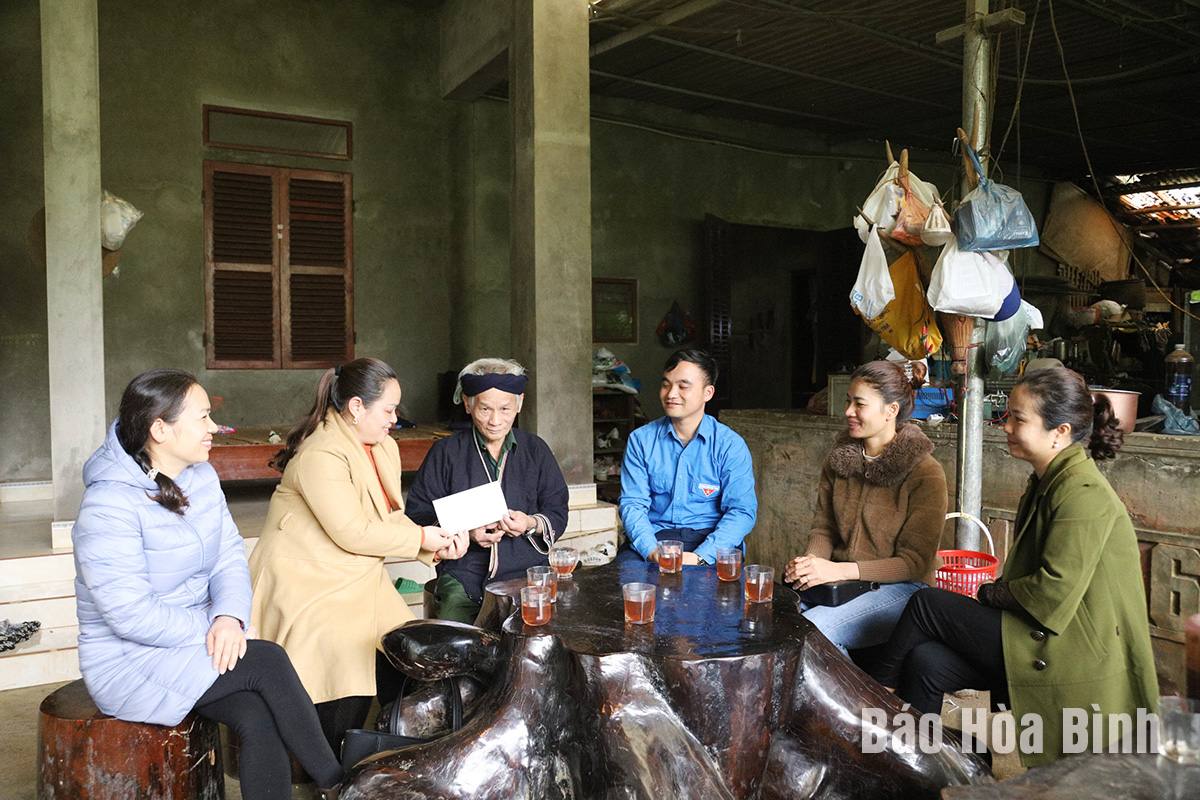
Toan Son commune in Da Bac district, with 70% of its population being ethnic minority people, has mobilised resources and created favourable conditions for local residents to access concessional loans to develop production. Thanks to the efforts, local livelihoods have seen positive changes.
Teachers from Toan Son kindergarten
present gifts to Dang Tien Dung’s household, a policy beneficiary family in Tra
hamlet.
Every year, when Tet nears, teachers from Toan
Son kindergarten bring a warm Tet to Dang Tien Dung’s household, a Dao ethnic
and policy beneficiary family in Tra hamlet.
According to principal of the kindergarten Ta
Thi Lam, the annual activity aims at joining hands with the local
administration to take care of the ethic people and those who rendered great
service to the nation. The gifts, small in value as they are, have encouraged
the families to overcome challenges and alleviate poverty.
Ban Van Huong, a prestigious Tra villager, said
thanks to the local Party organisation and administration's care, livelihoods
of the local ethnics have improved with average per capita income reaching 45
million VND (1,826 USD).
A wide range of agro-forestry economic models
have been developed while better roads have facilitated the sale of local farm
produce, he added.
Toan Son commune is now home to 688 families
with 2,600 people, with the Dao ethnics making up the lion's share of the local
population, mostly residing in Phu, Ranh and Tra hamlets.
Over the past time, the local Party organisation
and administration have carried out poverty reduction work and policies for
ethnic minority people, effectively implementing infrastructure development
projects and focusing on tackling local shortage of houses, land for production
and water.
Besides, they have implemented planning,
arranged settlement for local residents, and promoted the commune’s potential
and strengths to develop value chains for local products. Due attention has
been paid to developing sustainable agro-forestry economy in tandem with protecting
forests and improving locals’ income.
Statistics in 2022-2023 showed that more than
4.2 billion VND was mobilised for the national target programme on
socio-economic development in ethnic minority-inhabited and mountainous areas.
The capital was used to develop production, better local socio-economic
infrastructure, and ensure security, order and social safety.
Chairwoman of the communal People’s Committee
Dinh Thi Cuc said that the commune has been taking the care for the ethnic
minority people as an important mission, that’s why it has paid due regard to
building essential infrastructure, upgrading rural roads, supporting local
livelihoods through training and introduction of jobs to residents, and
carrying out support policies for the public servants who are responsible for
the ethnic work.
The commune resolves to improve the quality of
life of the ethnic minority people and promote sustainable poverty reduction,
contributing to realising the local socio-economic development missions, she
added.
More than just an information technology teacher, Bui Van Nien is an inspiring figure who has nurtured the scientific curiosity and creative spirit of students in Vietnam’s ethnic minority communities.
Da Bac is the most disadvantaged mountainous district in Hoa Binh province, with ethnic minorities accounting for about 90% of its population. Over the past years, the district has mobilised resources to implement ethnic policies to improve the quality of life of local people.
In recent years, Hoa Binh province has consistently prioritised the protection, care, and education of children, particularly those from ethnic minorities and disadvantaged backgrounds, by creating a safe, healthy, and nurturing environment for their all-round development.
The Steering Committee for Tobacco Harm Prevention and Control of Hoa Binh province, in coordination with the Tobacco Harm Prevention and Control Fund, held a ceremony on May 28 in response to the World No Tobacco Day (May 31) and the National No Tobacco Week (from May 25 to 31). The event was chaired by Nguyen Van Toan, Standing Vice Chairman of the provincial People’s Committee and head of the Steering Committee.
Since 2021, the Center for Industrial Promotion and Industrial Development Consulting (CIIDC) under the Department of Industry and Trade has been implementing a school lighting model as part of the plan for using energy efficiently and economically in Hoa Binh Province in the pẻiod of 2021 - 2025. This model not only aims to improve the learning conditions and enhance the education quality, but it also promotes the message of energy saving, energy security, environmental protection and contributes to the goals of socio-economic development.
In the 2024 - 2025 school year, the entire Hoa Binh provincial education sector includes 520 educational institutions and schools. Among them are 13 ethnic boarding schools with 153 classes and 4,487 students. Four of these schools have met national standards, reaching 30.7 percent.



